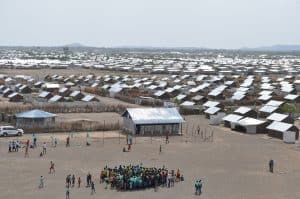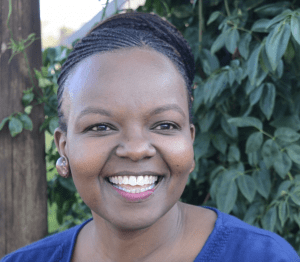Imagine Children Everywhere…

Kakuma camp: C. Wachiaya/UNHCR
Imagine fleeing from your home in South Sudan, leaving your mother behind and arriving in a vast refugee camp with your father and four siblings. Living in cramped conditions, you stay there for five years. Your father eventually remarries and in all this time you never see your mother. You long to go to her as you hear she is not well, yet you hold out little hope of ever seeing her again.
This is the story of just one girl Jacky spent time with when she spent a week in one of Kenya’s largest refugee camps, called Kukuma.
Having helped develop the ‘Children Everywhere Walking with Jesus‘ (CEWWJ) challenge sessions, Jacky who lives in Nairobi, Kenya was challenged to spend a week at Kukuma, sharing her life with 100 girls living in the camp. She wrote:
 “We had girls from Kenya, Congo and South Sudan who now live in the camps. Some are parenting already! Some have gone through marriages and found ways to escape. Some live with ‘elders’ that they have learnt to call parents yet even when they break down they can still afford to keep a smile.”
“We had girls from Kenya, Congo and South Sudan who now live in the camps. Some are parenting already! Some have gone through marriages and found ways to escape. Some live with ‘elders’ that they have learnt to call parents yet even when they break down they can still afford to keep a smile.”
Jacky spent time teaching the girls life skills and talking with them about their dreams and hopes for the future. They also talked about relationships and how to engage in healthy relationships despite the challenges in the camp.
Jacky intentionally used the five parts of the Children Everywhere Walking with Jesus vision as she ministered to the girls. She wrote down how she did this…
Children – Valuing them
We listened keenly to them and respected their opinions. We found out more about their interests and paid attention to that. We recognized how God treasures them despite their different orientations. We spent quality time with them.
Everywhere – Environment
We intentionally made sure they felt safe to be themselves. Allowing them to express their gifts, by encouraging them to lead the daily devotions. We saw the girls as being co-missioners with us. We also intentionally encouraged the quiet ones to speak and sometimes I would use encouraging words like ‘you are doing well’, ‘keep going’ and other times hold their hands as they spoke.
Walking – Learning
We used simple and practical ways of learning, mainly experiential. We ran some debates, games, singing, discussions, poetry, artwork and had a debrief after each activity. We used Kiswahili for the younger girls who could not understand English so well. There was also peer teaching where the older girls (teens) would sit for some sessions with the older pre-teens and share their learning experiences.
With – Relationships
During the evening we took time to share our lives together. I had moments of sharing with the girls one-on-one and other times I would share my life with them in groups. Being available to support them when their stories brought forth a mix of emotions was both wonderful and heartbreaking.
Jesus – Mission
We shared Christ’s love with them and they too shared their testimonies. The girls had the opportunity to sing songs they had composed, dance to the Lord and share God’s Word with one another.
Jacky said, “Please remember these girls in prayer. I pray that God will continue to use me and my friend to help them move from brokenness and start experiencing wholeness. Now I have an idea of what refugee camps in my country look like.”
The CEWWJ Challenge sessions have been written to help groups in homes, church or community look afresh at how they are reaching and discipling young people. They are currently available in English, French, Hindi, Portuguese and Spanish.
